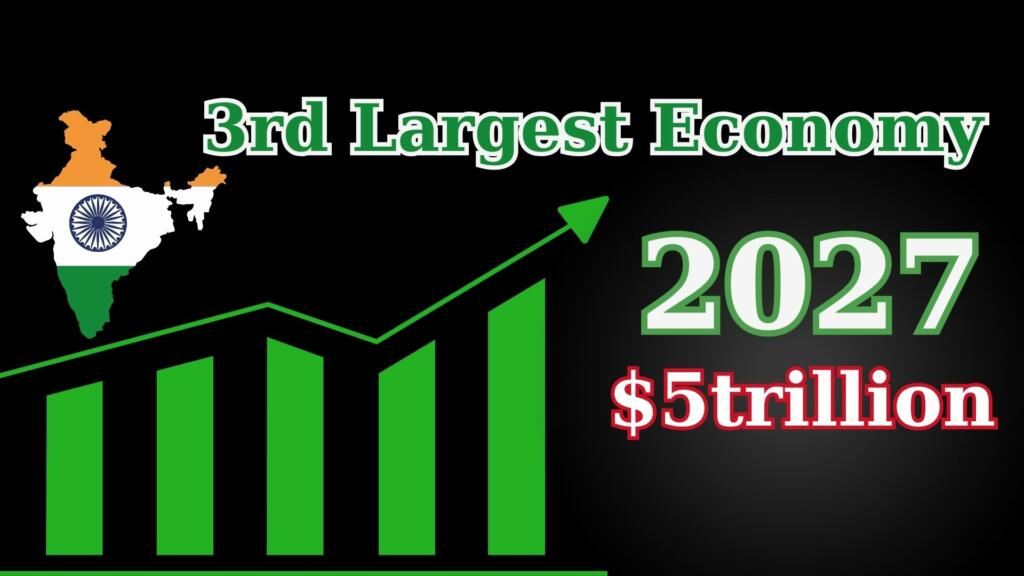India’s economic landscape is poised for remarkable transformation, with projections indicating that it will emerge as the world’s third-largest economy by 2027, surpassing stalwarts like Japan and Germany. This bold prediction comes from global brokerage Jefferies, underscoring India’s trajectory of growth and its potential to shape the global economic landscape in the coming years.
At present, India stands as the fifth-largest equity market globally, with a market cap expected to reach $10 trillion by 2023. The nation has demonstrated consistent economic expansion, with GDP growth averaging 7 percent CAGR in USD terms over the past decade, catapulting it from the eighth to the fifth largest economy globally. This growth trajectory is underpinned by several key factors that have fueled India’s economic ascent.
Central to India’s economic momentum is its demographic dividend, characterized by a consistent labor supply. With a youthful population and a burgeoning workforce, India possesses a demographic advantage that fuels productivity and innovation. Moreover, improvements in institutional strength and governance have instilled confidence among investors, paving the way for sustained economic growth.
Continued reforms play a pivotal role in maintaining India’s status as the fastest-growing large economy. The implementation of landmark initiatives such as the Goods and Services Tax (GST) in 2017 has simplified taxation and enhanced trade efficiencies, akin to the formation of the Euro. Additionally, bankruptcy reforms have facilitated a significant cleanup of corporate and banking sector balance sheets, bolstering governance standards and investor confidence.
Also Read: Modi-fied Uttar Pradesh: A Journey Through Innovation and Ingenuity
India’s surge in market capitalization reflects growing investor interest and confidence in its economic prospects. Despite its current position as the fifth-largest globally, India’s weight in global indices remains relatively low. However, this is poised to change as market free float increases and anomalies in weight allocations are rectified, signaling greater recognition of India’s economic potential on the global stage.
Geopolitical dynamics also play a pivotal role in shaping India’s economic trajectory. Strengthening relations with key global players such as the western world, Japan, Australia, and the Middle East augur well for India’s economic growth prospects. Enhanced diplomatic ties not only foster trade and investment but also bolster India’s geopolitical standing, further catalyzing economic expansion.
India’s burgeoning entrepreneurial ecosystem underscores its transition into a global innovation hub. The nation boasts 111 unicorns, with a combined market value of $350 billion, positioning it as the third-largest unicorn hub globally, trailing only behind the US and China. Government initiatives aimed at fostering digital infrastructure development, coupled with the availability of abundant homegrown talent, have propelled India’s entrepreneurial landscape to new heights.
Also Read: From blasts to blossoms: PM Modi’s vision transforms J&K post 370
Furthermore, India’s prominence as a services exports hub underscores its global competitiveness. With services exports reaching nearly $450 billion annually, India plays a pivotal role in driving global economic activity. Major multinational corporations, including JP Morgan, Intel, and NTT, rely on India’s skilled workforce, reinforcing its position as a global services powerhouse.
India’s corporate culture, characterized by a focus on return on equity (RoE) and sustainable investment habits, augurs well for minority investors. A diversified listed equity market and a robust institutional framework, spearheaded by regulators such as SEBI and RBI, have cultivated a large domestic investor base, reducing market volatility and fostering sustainable growth.
In conclusion, India’s journey towards becoming the world’s third-largest economy by 2027 is underpinned by a confluence of factors, including demographic dividends, institutional reforms, and geopolitical dynamics. Continued focus on reforms, coupled with a vibrant entrepreneurial ecosystem and a robust services sector, positions India as a key player in the global economic arena. As the nation navigates the challenges and opportunities that lie ahead, its economic ascendancy promises to reshape the global economic landscape in the years to come.
Also Read: Modi-fying Gujarat: Gears Up for Rs. 44,000 Crore Infra Overhaul
